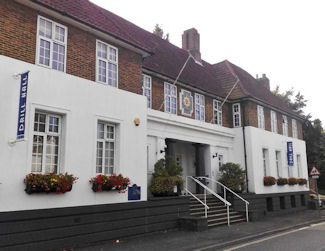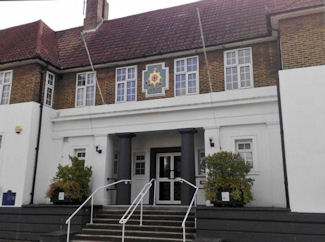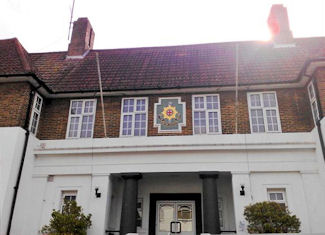Horsham
Drill Hall, Park street
Denne roadall
Denne roadall
'4th Battalion Royal Sussex Regiment (E Co.); head quarters, Drill hall, Park street.'
ds 'A' Squadron Sussex Yeomanry
(References Kelly 1911)
Early history: from Kelly's Post Office Directory of Essex, Herts, Middlesex, Kent, Surrey and Sussex, 1867, 'Armoury office of the 7th Sussex Volunteers (Jonathan Reynolds, sergeant instructor), Market square.'
Kelly 1899 makes reference to the 'Seventh Sussex Club, in Park street, erected by Capt. Hubbard, 1873, comprises a large drill shed, gymnasium, reading room and a library of about 150 volumes, as well as card and refreshment rooms and lavatories; a new billiard room was erected in 1892. The E Company of the 2nd Volunteer Battalion, Royal Sussex Regiment, have their headquarters in Park street.'
The Denne road drill hall is not shown on the 1912 OS map and we believe it is outside the scope of the project. However, we include the following as an example of good practice in the community use of a former drill hall.
In February, 2004, Horsham District Council published a Press Release [PR], stating that the future of the Drill Hall was to be decided. The PR drew attention to the fact that the Territorial Army centre at Denne Road had played a significant part in military recruitment 'for generations.'
The PR continued: 'The Drill Hall, the main building, was often used for public events including Saturday dances, glittering dinners and political meetings, the most notorious of which involved the British fascist leader Oswald Mosley.' The site was declared redundant in a Ministry of Defence re- organisation, and local people feared that the land would be quickly sold for development.
The local council made an offer to purchase, pointing out that the Drill Hall had been built mainly from public donations raised by the soldiers themselves and it should therefore continue to be available for the community. The army reconsidered and as a result, the people of Horsham were permitted to retain the site. In 2001 it was bought by the council for £1m.
The Drill Hall was refurbished, at a cost of £250,000. Since then, it has been well used by the community for drama, arts and festivals. The former Quarter Master's store was developed as a rehearsal and recording studio for local musicians.
The Drill Hall is still in use for public events, dances, classes, clubs, festivals and art exhibitions (2009). Its website states proudly that it has been 'A Community Hall since 1927.'
(References Kelly 1911)
Early history: from Kelly's Post Office Directory of Essex, Herts, Middlesex, Kent, Surrey and Sussex, 1867, 'Armoury office of the 7th Sussex Volunteers (Jonathan Reynolds, sergeant instructor), Market square.'
Kelly 1899 makes reference to the 'Seventh Sussex Club, in Park street, erected by Capt. Hubbard, 1873, comprises a large drill shed, gymnasium, reading room and a library of about 150 volumes, as well as card and refreshment rooms and lavatories; a new billiard room was erected in 1892. The E Company of the 2nd Volunteer Battalion, Royal Sussex Regiment, have their headquarters in Park street.'
The Denne road drill hall is not shown on the 1912 OS map and we believe it is outside the scope of the project. However, we include the following as an example of good practice in the community use of a former drill hall.
In February, 2004, Horsham District Council published a Press Release [PR], stating that the future of the Drill Hall was to be decided. The PR drew attention to the fact that the Territorial Army centre at Denne Road had played a significant part in military recruitment 'for generations.'
The PR continued: 'The Drill Hall, the main building, was often used for public events including Saturday dances, glittering dinners and political meetings, the most notorious of which involved the British fascist leader Oswald Mosley.' The site was declared redundant in a Ministry of Defence re- organisation, and local people feared that the land would be quickly sold for development.
The local council made an offer to purchase, pointing out that the Drill Hall had been built mainly from public donations raised by the soldiers themselves and it should therefore continue to be available for the community. The army reconsidered and as a result, the people of Horsham were permitted to retain the site. In 2001 it was bought by the council for £1m.
The Drill Hall was refurbished, at a cost of £250,000. Since then, it has been well used by the community for drama, arts and festivals. The former Quarter Master's store was developed as a rehearsal and recording studio for local musicians.
The Drill Hall is still in use for public events, dances, classes, clubs, festivals and art exhibitions (2009). Its website states proudly that it has been 'A Community Hall since 1927.'
Thank you to Russell Gore for sending us the photographs of the Drill Hall.

Horsham Drill Hall

Horsham Drill Hall - Entrance

Horsham Drill Hall - Detail of Entrance
© All material is copyright - refer to the
Terms of Use
the first attempt at content
Introduction
About
Anatomy
Drill
 Database
Database
 Memorabilia
Memorabilia
Resources Glossary
Saving Halls Participate Contact What's New? Terms of Use
Drill
 Database
Database Memorabilia
MemorabiliaResources Glossary
Saving Halls Participate Contact What's New? Terms of Use
The Drill Hall Project - Charting a neglected legacy